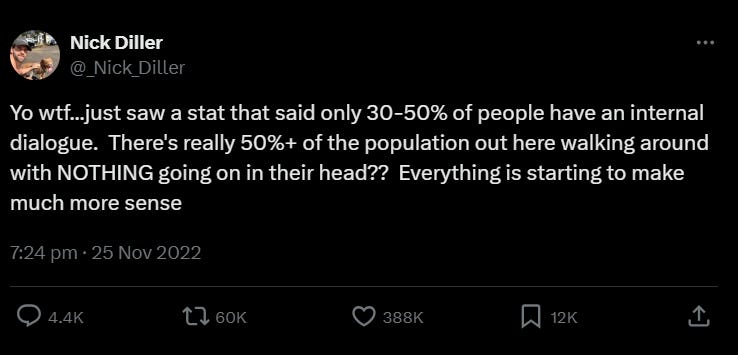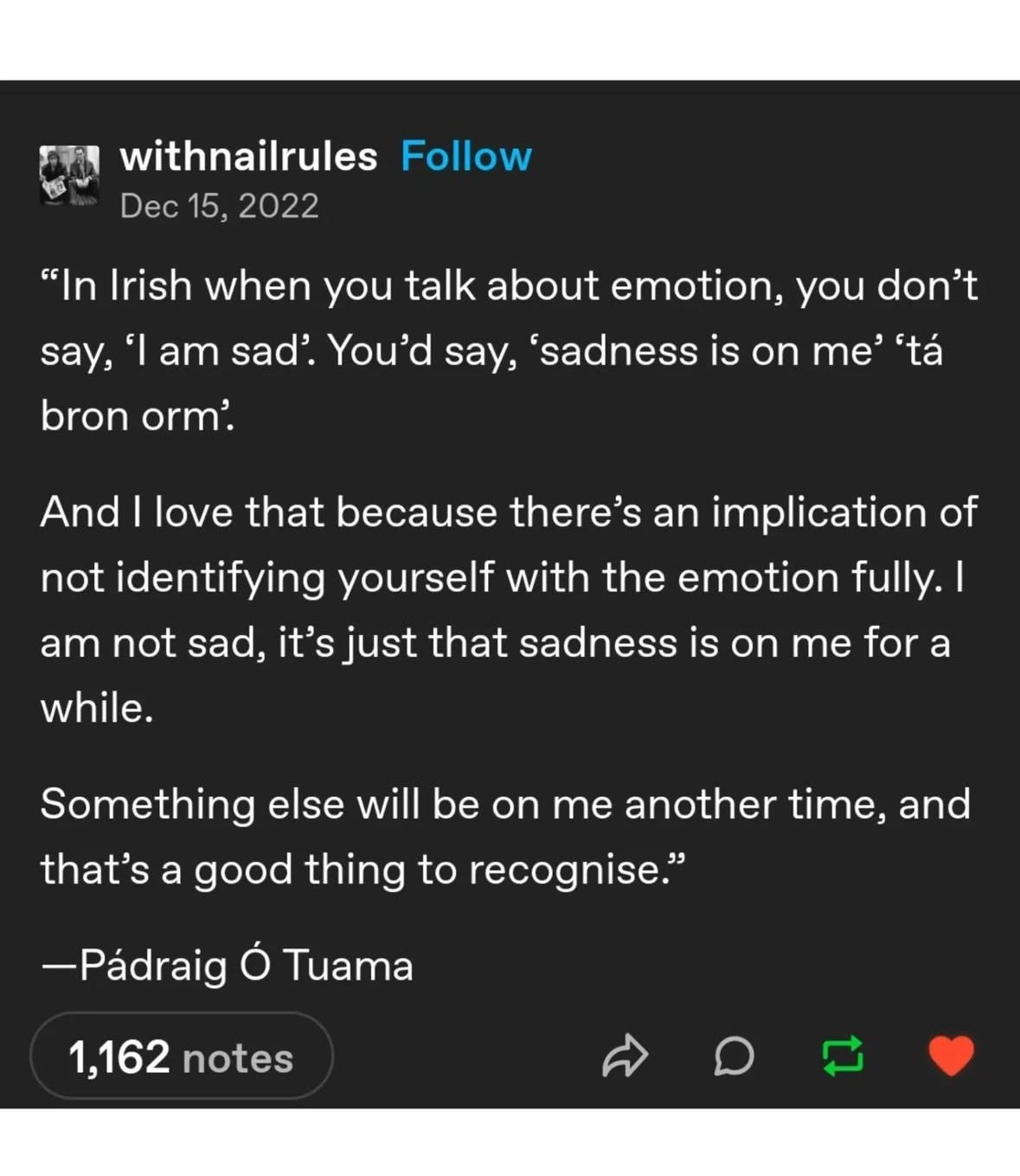It's not overthinking; it's metacognition, babe
Are you an overthinker? Well, think again! Because you and the world may just have been mislabeling you all along!

Ninth grade. The classroom buzzing. Me, fourteen years old, yet again being told I was thinking “too much”.
And then, casually, someone walked next to me as I stood by the window, frustrated and alone, and said:
You're not overthinking, Hargun. That's just your level of thinking. It seems 'over' to everyone else because they are not at that level.
I have not spoken to her in over 14 years. I don’t remember much about her other than her name and her long braids. But I never forgot what she said—it wasn’t a compliment or a critique, just a fact—I just forgot, for a while, to actually believe it.
But I have carried that sentence around like a random key in my pocket for years. Only now do I understand what door it was meant to open.
It’s not overthinking; it’s metacognition, babe
I didn't know it at the time, but what she saw in me had a name. It's called metacognition.
It’s the mind’s ability to notice itself, to think about thinking.
It’s not a flaw. Not a failure. Just a different kind of awareness—a deeper, sometimes heavier kind.
But since I had no awareness of “metacognition” as a concept, I let people call me an “overthinker” for much of my life. And, defeatedly, I called myself one too.
Even when that classmate said something so profound, I couldn’t hear her clearly—because everyone else’s voice was louder.
But now? Now, I will believe psychology. Now, I will believe biology. And most of all—I will believe myself.
Quick pause before we dive in:
Cognition is just a fancy word for the act of thinking—
how our minds sense, solve, and story-tell.
Metacognition is thinking about our thinking—
stepping back to notice and guide the flow.
Most of this happens in the prefrontal cortex,
the brain’s little HQ for reflection, planning, and self-correction.
Okay, but what really is metacognition?
Simply put, metacognition is: thinking about thinking.
It’s the psychological skill that lets you observe, question, and regulate your own mental processes—almost like having a mind that can step outside itself, midstream, and ask: What am I doing? Why am I doing it? And is this working?
Typically, there are two parts to it:
Monitoring: Noticing what you are thinking and feeling.
Controlling/regulating: Deciding what to do with that information.
Most people do both of these unconsciously, in flashes. But for some of us, it's like being under water with your eyes open—constantly aware of the breath, the current, the pull, the temperature.
We don't just feel an emotion; we notice the feeling, question where it came from, predict where it might lead, and analyse whether it aligns with our sense of self.
This is not anxiety. This is not dysfunction. It is an advanced cognitive feature: the ability to reflect, revise, and reframe our own internal worlds in real time.
Let’s look at some quick examples of metacognition.
But first, an important disclaimer
I’m not a psychologist, therapist, or licensed mind-fixer of any kind.
I’m just a writer , a lifelong "overthinker" (mislabeled, thank you very much), and a deeply curious mind trying to make sense of herself and the world.
This essay is me thinking about thinking, not diagnosing anything or anyone.
Please treat this essay as a conversation, not a clinical guide.
Everything here is stitched together from my reading, learning, living—and honestly, despite all my research, I have no idea how far off I might still be from factual accuracy.
Examples of metacognition
Monitoring: Realizing halfway through a conversation, "I'm getting defensive."
Controlling: Pausing, softening your tone, or clarifying your intent instead of escalating.
Monitoring: Noticing you feel tired and irritable before making an important decision.
Controlling: Postponing the decision until you're rested, to avoid distorted judgment.
And then there are finer, more creative expressions of metacognition—like self-editing.
I am a self-editing person
A few years ago, one of my favourite authors, Jerry Pinto, looked at a note I had written inside a copy of his book for a friend.
I had written, "Hope this book speaks to you the way it did to me," but immediately, I had added in parentheses, "(not the way per se but the fact that it did)."
Jerry smiled and said, "Your friend seems like a self-editing person—like me."
When she relayed that incident to me, I was squealing with joy and yet I didn’t completely understand what he meant by “self-editing” person, though I got the essence for the most part.
What he caught— and what I only now understand—is that I was performing metacognition in real time:
Monitoring: Sensing that my original words might misrepresent what I truly meant.
Controlling/Editing: Revising them on the spot to be more faithful to my intention.
Self-editing, one of the many behavioural expressions of metacognition. It is not "overthinking"; it's the art of fine-tuning our inner life as we offer it outward.
I want to be precise because I respect language.
I want to be transparent because I respect the people I communicate with.
I want to be accurate because I respect my own experience, and want it to be honoured properly.
Self editing is a form of integrity, not neurosis.
And with Jerry Pinto seeing it instantly it felt like such a precious kindred spirit moment.
But self-editing isn't the only way metacognition shows up in daily life. Sometimes, it’s even simpler.
Sometimes, it sounds like...talking to yourself.
Talking to yourself: Is that normal?
First, a quick question for you:
So for some context, few years ago this Tweet went viral:
And I?
I don’t just have an inner dialogue, I actually speak out loud to myself. And for a long time I thought I was crazy (and perfectly okay with that, btw).
Hargun, what are we thinking right now?
Okay, it’s alright, you’re safe now, let’s just shake it off.
No, no, no keep the phone aside. No doomscrolling, finish this task first.
You’re being mean to yourself. Is that what I have taught you?
Before, I knew that talking out loud to yourself was either a sign of genius or being absolutely unhinged—depending on who was watching.
But now I know: talking to yourself is just another expression of metacognition.
It's the mind not just thinking silently, but making its thoughts audible, so it can monitor, regulate, and guide itself better.
Children do it openly. Spend five minutes with a young child and you’ll hear them narrating their entire life!
Now I'm picking up the block.
Now I'm putting it here.
Oops, it fell, silly me!
And they do it without shame or hesitation. Bless them!
It's how they learn to think about their own thinking. It's how they practice metacognition before they even know the word. And some of us? We just never stop doing it.
It’s not madness. It’s a sign of an active, self-aware mind. A mind alive enough to want a dialogue with itself, not just a monologue. And honestly? It makes for excellent company. 10/10 recommend.
But now, let’s get to the real meat of the matter: What actually is the difference between metacognition and overthinking?
(Or was all of this just an elaborate ploy for me to assign a fancy psychological term to my spirals and feel better about them?)
Metacognition vs overthinking: How are they different?
The thing is, metacognition and overthinking can look awfully similar from the outside. So no, I don’t blame all the people who called me an “overthinker.”
After all, both involve “a lot of thinking” and analysing. Both can make you pause before you take action. And both can make you seem a little “too serious” for casual conversation.
But now I know the truth: What’s happening inside the mind is completely different.
Metacognition is high-quality thinking
It’s when you can notice your thoughts, question them, shape them, and move forward. It’s like being the driver and the GPS at the same time.
Overthinking is bad-quality thinking
It’s when you get stuck in endless roundabouts of doubt, fear, and second-guessing without ever picking an exit. No destination. No map. Just vibes and nausea.
Metacognition has structure, an architecture.
Awareness → Evaluation → Strategy → Adaptation.
It moves you somewhere.Overthinking has chaos.
Awareness (sometimes) → Catastrophizing → Panic → Paralysis.
It keeps you trapped.
With metacognition, you’re feeling: clear, flexible, empowered. The energy is intentional. With overthinking, you’re feeling stuck, exhausted, panicky. The energy is anxious.
With metacognition you want to understand—be observant and then adapt accordingly. With overthinking you’re just stuck in a loop that is judgmental and frustrating.
Examples of the difference
Metacognition is when your brain says:
Hm. That thought is making me tense. Why? What’s the truth here? What can I do about it?
Overthinking is when your brain says:
Oh god oh god oh god everything is doomed I need to fix it but what if fixing it makes it worse??
You see the difference?
What’s so important to remember is that if you ever stop yourself and ask: Am I overthinking? What’s going on, why is this making me feel this way?
That too is metacognition. Because overthinkers, people who are just stuck at the first level of cognition? Yeah, they don’t even realize it.
The difference between metacognition and overthinking isn't how much you think—it's how free you are inside your thinking. And when you are free? You’re not spiraling. You’re soaring.
Metacognition is you standing at the riverbank, thoughtfully watching the water flow.
Overthinking is you falling face-first into the current and getting dragged for miles.
The honest part: I fall on my face all the time
You’d think that knowing the difference between metacognition and overthinking would make me immune. Like some wise monk, serenely observing her brain with no drama.
Yeah. No.
It’s shockingly easy to fall from graceful self-awareness into full-blown mental chaos.
One minute you're a calm scientist studying your thoughts; the next, you're a conspiracy theorist trapped in your own head.
If I had to put numbers to it:
I’m probably 70% metacognitive, 30% absolutely losing my mind.
And that 30%? Oh, it sneaks up on you. You think you're gently reflecting—and suddenly you're planning fake conversations with people who aren't even mad at you yet.
The point is: Falling into overthinking doesn’t mean you’re broken. It means you have a brain. That you don’t live by “ignorance is bliss” as your default cruiser mode. Congratulations!
I think, the goal here isn’t perfection. It’s noticing the fall faster, laughing a little, and climbing back up before you drown.
How to stay in metacognition?
Here are some things I have been doing over years without even realizing:
Journaling (and writing)
I have been journaling since I was in 2nd grade albeit the “Dear diary” way. And apparently, journaling helps build metacognition awareness.
Journaling allows you to give space to your thoughts outside of your body/mind. This, in turn, helps you observe + edit them; not just feel trapped or lost in them.
Yes, I do recognize that being a writer helps me with my metacognition. But then again, I think it’s the other way round. I am a writer because I have always been so aware of my thinking.
Label your thoughts, not yourself
Psychologists call this "cognitive defusion”—letting thoughts come and go, acknowledging them, without getting trapped in them. Like they are clouds passing in the sky. Like they are waves kissing your feet.
Instead of: I'm anxious
Try: I'm noticing that I'm feeling anxious.
It creates a tiny, powerful distance—you are more than any one thought.
But this practice has its roots in culture and language too.
Don’t have feelings about your feelings
Might be slightly related to the above point but the thing is, when you’re feeling sad, don’t bully yourself and keep asking—why am I feeling sad over this?! It’s so pathetic! What does it even mean about me if I feel sad over this? I should not feel this way.
Please, don’t be a bully. Just feel what you’re feeling without judgement.
And now the one tip I didn’t know but will after all the research for this essay is:
Ask: Is this helping me move forward?
Basically, do a simple metacognitive check-in. If your thoughts are clarifying, empowering, softening—you're likely in metacognition.
If they're freezing you, shaming you, or making you panic—you might be stuck in overthinking.
Ultimately, metacognition isn't about never spiraling again. It's about staying curious, not cruel, about your mind.
To all the meta baddies, with love
I guess what I am trying to say is that this whole intense essay was just a love letter to my fourteen year old self:
You were never an “overthinker” after all. You were just a thinker who refused to turn off the lights when everyone else said it was bedtime.
Metacognition isn’t something broken that needs fixing. It’s something beautiful that needs understanding. It’s not the enemy of peace; it’s the doorway to deeper, richer peace—the kind that isn’t afraid to meet itself in the dark.
If you’ve ever felt “too much” for this world—too observant, too reflective, too tangled in your own webs—I hope this essay made you feel seen, understood, and celebrated.
Because metacognition is something to honour, not pathologize.
And if this resonates with you, I’d love to hear: Have you ever been called an overthinker? What’s your relationship with your own mind like? How do you stay (or fall out of) metacognition?
Let’s think about thinking together, all my meta baddies!
With love,
Meta-baddie-in-chief, reporting live from inside her own head







This has changed my perspective. It doesn’t happen often, but I’m mind-blown. I’ve felt ashamed of this for my whole life and I’ve internalized other people’s commentary and I’m just working on “fixing it”. The other day, my husband caught me talking in my usual, metaphorical way and he said “wow your inner life is really intense. I don’t know if I’d describe things like that.” And I was so confused, because to me it’s just natural to process things the way I do.
Now, you gave me something to think about, because I’m often stuck between metacognition and overthinking. But the added layers of shame don’t help.
Thank you for this. You’re a life saver! 💙🔥
Got me thinking about thinking Hargun. As I read more of your essays, I am slowly seeing this connective thread between the voice you have now and the voice you had growing up. Almost like a conversation between the two but in real time. Excellent research here. I love how this essay had polls, stats, tweet shots and more. Have to be kinder to my thought spirals now and make clear distinctions between metathinking and overthinking. Not all thinking is really that bad. Sometimes it is just a conversation with yourself. And that is okay right!